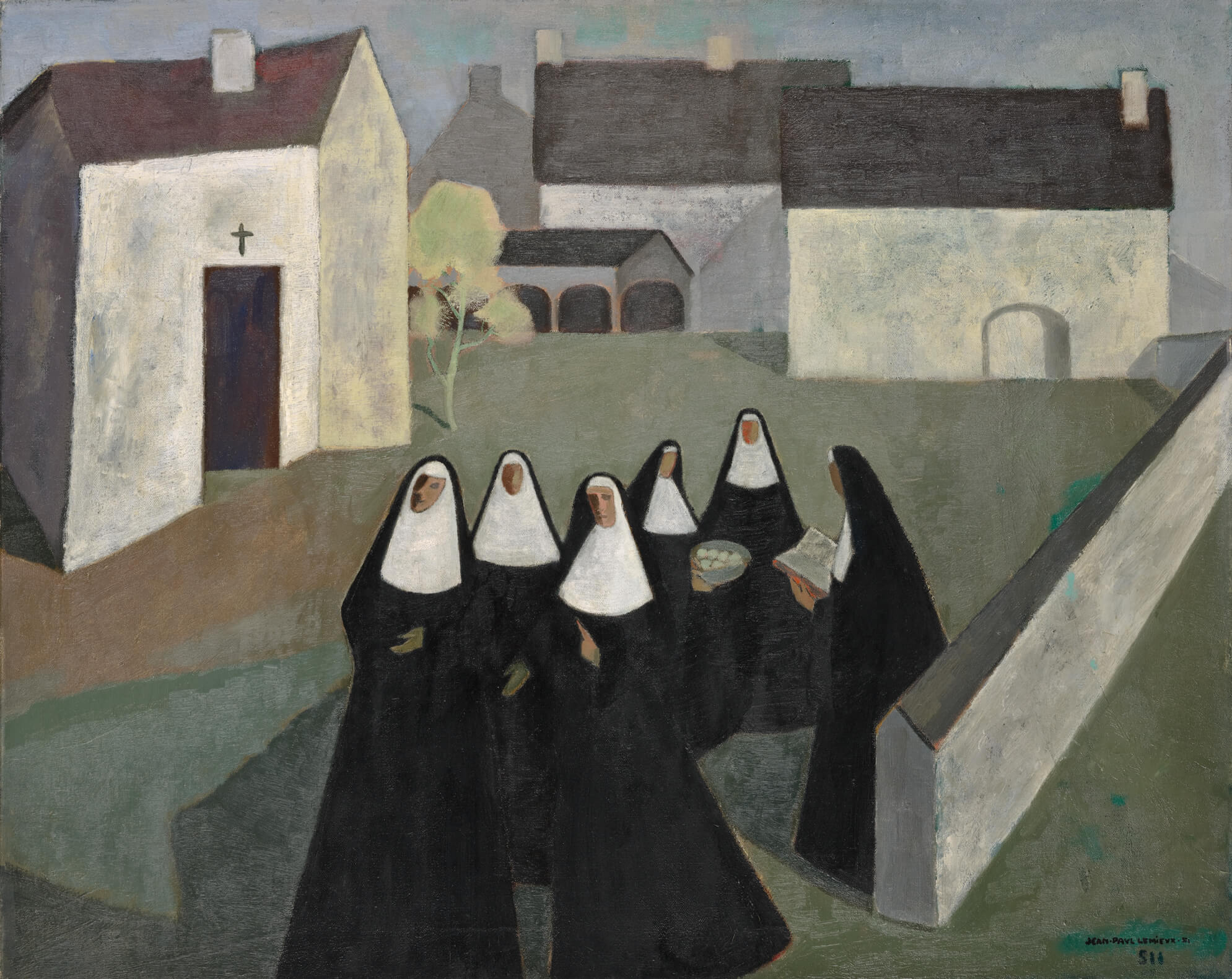The Warble
The Official Blog of Karen Ullo
The Indomitable Nuns of the French Revolution

Jean Paul Lemieux, The Ursuline Nuns, 1951
If it’s true, as the philosophers say, that eternity is the experience of all time at once, then surely writing about history is one way to practice for heaven. I’ve seemingly lived a good chunk of my recent life in the eighteenth century, and I can now expound upon everything from the process of producing indigo dye to the sanitation system (or lack thereof) at Versailles. This week, I’ve had the fun of researching life among the cloistered teaching orders of religious sisters in revolutionary France. The book I’m reading is A Social History of the Cloister: Daily Life in the Teaching Monasteries of the Old Regime by Elizabeth Rapley.*  This kind of research is its own special sort of entrée into eternity because the women in this book are my sisters in Christ. I might get to meet them someday, outside of this time. And that’s an exciting prospect because many of them were completely badass.
This kind of research is its own special sort of entrée into eternity because the women in this book are my sisters in Christ. I might get to meet them someday, outside of this time. And that’s an exciting prospect because many of them were completely badass.
What’s not exciting to read about is the Church in eighteenth century France, either before or after the revolution. Before, you find an absolute muddle of a Church that answers to both the pope and the king, a political minefield of power-hungry clerics and money-grabbing statesmen who are frequently engaged in non-violent but very real wars against each other, with little or no regard for either the public welfare or the spiritual health of the kingdom. It’s enough to make ordinary people want to grab their muskets and revolt against them both…
After the 1789 revolution, however, it’s fair to say that Hell broke loose. Even before The Terror imprisoned and massacred thousands of priests and nuns, the government seized all Church property. Then, the 1790 Civil Constitution of the Clergy required all clergy to swear an oath of allegiance to the government, thereby denying all papal authority. But of course, not everyone did:
On 9 April 1791, the town [of Saint-Sever] prepared to receive its new constitutional bishop, Jean-Pierre Saurine, with full honours. At four in the afternoon, the cannon sounded and the bells rang out as planned—all except those of the Ursuline convent. Immediately several armed men went to the convent and demanded that the bells be rung. When the nuns replied that they could not do so in good conscience, the soldiers began to chop down the door. Thereupon Reverend Mother capitulated—after a fashion: “We are not going to ring them, but since you want it done, come in and ring them yourselves.” By this time the troop had swollen in numbers, and the community waited anxiously as the men tramped through the building and rang the bell. They left peaceably enough, but war had been joined, and the nuns knew it.
Next morning the new bishop—“the intruder,” as the nuns persisted in calling him—departed, leaving orders for the convent to conform to the new laws. Several hours later, the bishop’s delegate, accompanied by the mayor, the syndic, another notable, and an “ex-Capuchin” arrived at the grille. The syndic read out an official order installing the ex-Capuchin as the monastery’s director and forbidding the nuns to hear Mass from anyone else. Then the delegate began to speak with charm and benevolence, only to be cut short by the Reverend Mother: “Permit me to speak from my heart and that of my community. We will not recognize any bishop other than the one to whom we have vowed obedience. We cannot accept Mr. Saurine; we will not obey any order from him, and we will never communicate with any priest sent by him. These are the sentiments of the Ursulines of Saint-Sever. They cannot be false to the promises they made at the foot of the altar on the day of their profession; to be faithful to those promises, they will bear every thing and joyfully suffer even death itself.” The delegate asked if he could have this in writing. The nuns assented, the whole community signing the statement.
Those nuns held firm, refusing even to take possession of letters sent to them by would-be Bishop Saurine. They endured months without a priest or access to the sacraments, being forced out of their own church before, surprisingly, winning it back in 1791 when “local authorities were forced to acknowledge the law passed by the National Assembly that ‘freedom of worship is implicit in the Declaration of the Rights of Man.’” For the moment, the Ursulines had won.
Also in 1790, an inquest took place in which all nuns were offered the opportunity (in the name of liberté) to renounce their vows and assume a secular life. The number who chose to accept was “infinitely small.” Rapley does not cite a national total, but in the cases she does cite, the average is a fraction of one percent.
The Catholic Church of late eighteenth century France was in many ways a diseased political swamp, which then became a government-sponsored anti-Church. All but four bishops refused the oath of allegiance, but some fifty-five percent of priests swore their faith to Mammon. Certainly, some nuns did, too. But it is always in the greatest trials that heroes are born, and this was an age of martyrs. Many heroes remained hidden away in French monasteries, their names and deeds often lost to history. But their quiet, steadfast adherence to the Truth in Jesus Christ will be written large in heaven.
The official’s interrogation of the old lady, an ex-Ursuline, who had been discovered running a small clandestine school, occurred in the Year V.** Here is a part of the interview as it survived in local tradition: (Q) “What doctrine are you teaching your pupils?” (A) “The faith of our fathers.” (Q) “And if our fathers were mad, would we have to follow them?” (A) “Citizen, I knew your father; he was a good Catholic and a man of sense and character. He would not have spoken to me as you are doing.” The official’s reply is not recorded. He did not have spiritual descendants to commemorate his words and deeds. The old nun did.
*This book is out of print, but several used copies are available online. I’m waiting for my second copy to arrive because the first was missing twenty pages!
**Year V refers to the French Republican Calendar, which makes me roll my eyes every time I see it. Year V began on September 22, 1796. The woman in this story is an “ex-Ursuline” because by this time, all monasteries had been forcibly closed.
Karen Ullo is the author of two novels, Jennifer the Damned and Cinder Allia. She is also the managing editor of Dappled Things literary journal and a regular Meatless Friday chef for CatholicMom.com. She lives in Baton Rouge, LA with her husband and two young sons. Find out more at www.karenullo.com.
Finding Each Other

It’s been well over a decade now since people began to murmur about a renaissance of Catholic literature. A great deal of progress has been made in that time, from the establishment of journals and publishing houses (Dappled Things remains a trailblazer; we’re a good bit more than a decade old), to the emergence of too many talented novelists and poets to list. As Joseph Pearce recently pointed out in The Imaginative Conservative, the piece of the puzzle that’s still missing is the patrons. The great writing is out there. It’s the audience that is proving elusive.
But as the movement of Catholic literature has grown, it faces another problem, which is that so many people had the same idea around the same time—to foster the growth of Catholic literature—that the various groups working toward this goal often do not know the others exist. Sometimes, they even unknowingly step on each others’ toes. For example, on September 19-21 of this year, you can attend the Catholic Imagination Conference at Loyola University in Chicago, or, on September 20-22, you can join the Catholic Writers Guild Online Conference… but you can’t do both. A little cross-pollination between the groups might result in better planning and a healthier literary culture.
This is only one example of a frustrating trend I’ve been observing for years now. From Facebook groups and blogs to conferences and guilds, the Catholic writers are getting together, but only in niche groups that often seem to operate in vacuums. You can find the high-end literary folks in one place, the sci-fi aficionados in another, the poets here, the devotional writers there, the YA writers here, the people who struggle with faith but still identify as Catholic over there… Many groups are inclusive, in the sense that they welcome all sorts of different voices, but there’s still such a multiplicity that no one can keep up with them all.
All of this is good. The more, the merrier, and it’s always been true that birds of a feather flock together. Writers need support from other writers who understand their voices and perspectives. Also, the more outlets there are for finding some kind of entrée into Catholic literature, the more people will come in. Multiplicity is beautiful. But it can also be divisive.
One solution is to rally the troops around a central organization. The Catholic Writers Guild already exists. It’s small and imperfect, but the groundwork for a real professional guild is there, and the more people who join (and volunteer!), the better able it will be to serve. But beyond that, I see a real need for all of us to reach out—to leave our comfort zones, forget our preconceived notions of what a Catholic Literary Renaissance ought to look like, and explore what it really is. Those from traditional publishing backgrounds need to read self-published books, and vice versa. The academics need to talk the less scholarly among us, and the less scholarly need to appreciate and understand the work of academics. Those who are hosting conferences need to include voices that don’t sound like Flannery O’Connor and Graham Greene, and those whose work is less traditional need to appreciate and understand tradition.
I’m aware that this proposal is vague. That’s partly because I don’t have anything more concrete to offer right now, and partly because my aim is to foster a much longer conversation. Please, join in. Use the comments box below, or bring this question out to whichever groups you belong to and propose it there. We are all the Body of Christ. Some may be called as teachers, others as apostles, others as poets, others to write children’s books, or literary criticism, or fantasy, or memoirs. But we are all one body, and without the least of our parts, we will falter. Let’s find each other in charity and work together in Christ.
Karen Ullo is the author of two novels, Jennifer the Damned and Cinder Allia. She is also the managing editor of Dappled Things literary journal and a regular Meatless Friday chef for CatholicMom.com. She lives in Baton Rouge, LA with her husband and two young sons. Find out more at www.karenullo.com.
40% off for my 40th Birthday!

Update: This offer has ended, but the regular price is only $3.99. Still a bargain!
It’s my 40th birthday, so I’m offering 40% off the Kindle edition of Cinder Allia, one week only. Go buy yourself a present!
Cinder Allia has spent eight years living under her stepmother’s brutal thumb, wrongly punished for having caused her mother’s death. She lives for the day when the prince will grant her justice; but her fairy godmother shatters her hope with the news that the prince has died in battle. Allia escapes in search of her own happy ending, but her journey draws her into the turbulent waters of war and politics in a kingdom where the prince’s death has left chaos and division.
Cinder Allia turns a traditional fairy tale upside down and weaves it into an epic filled with espionage, treason, magic, and romance. What happens when the damsel in distress must save not only herself, but her kingdom? What price is she willing to pay for justice? And can a woman who has lost her prince ever find true love?
Surrounded by a cast that includes gallant knights, turncoat revolutionaries, a crippled prince who lives in hiding, a priest who is also a spy, and the man whose love Allia longs for most—her father—Cinder Allia is an unforgettable story about hope, courage, and the healing power of pain.
The best fantasy novel of 2017 (tied), CatholicReads.com
Finalist in fantasy, The 2018 Next Generation Indie Book Awards
Karen Ullo is the author of two novels, Jennifer the Damned and Cinder Allia. She is also the managing editor of Dappled Things literary journal and a regular Meatless Friday chef for CatholicMom.com. She lives in Baton Rouge, LA with her husband and two young sons. Find out more at www.karenullo.com.
Catholic Vampire Fiction

Believe it or not, Catholic Vampire Fiction is an emerging genre of literature. Turns out, I’m not the only crazy Catholic to see a lot of deeply religious dramatic possibilities in the undead. I’ve teamed up with three other amazing Catholic vampire novelists: Eleanor Bourg Nicholson (A Bloody Habit), Gabriel Blanchard (Death’s Dream Kingdom), and J.B. Toner (Whisper Music.) We’ve got a Facebook page now where we can geek out on Gothic together. BYO stakes and holy water, and come give us a like!
Karen Ullo is the author of two novels, Jennifer the Damned and Cinder Allia. She is also the managing editor of Dappled Things literary journal and a regular Meatless Friday chef for CatholicMom.com. She lives in Baton Rouge, LA with her husband and two young sons. Find out more at www.karenullo.com.

Recent Comments